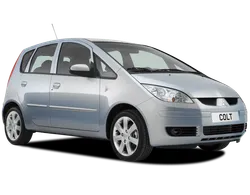

Mitsubishi Colt Generation 3 C50 Overview
Explore the Mitsubishi Colt and its Generation 3 C50 models. Discover unique features, specifications, and insights about the Mitsubishi Colt in Portugal.
The Mitsubishi Colt Generation 3, known internally as the C50, was a significant model in Mitsubishi's lineup, produced from 1982 to 1988. This compact hatchback and s...
Technical Specifications
Select Version
Dimensions
Engine
Driving
Others
History and Features
Mycarro AI
Apr 27, 2025
Introduction to the Colt Generation 3
The Mitsubishi Colt Generation 3, known internally as the C50, was a significant model in Mitsubishi's lineup, produced from 1982 to 1988. This compact hatchback and sedan offered a blend of practicality, style, and efficiency, making it a popular choice in various international markets. As part of a long-running series, the Colt C50 represented a pivotal shift in Mitsubishi’s design philosophy and technological advancements, appealing to a wide demographic of drivers looking for reliability and value.
Design and Features
When the Colt Generation 3 debuted, it presented a modern aesthetic that was distinctive for a compact car of its era. The body design was characterized by smooth lines and a rounded profile, contributing to its aerodynamic efficiency. It was available in multiple body styles, including three-door and five-door hatchbacks, as well as a four-door sedan, catering to varying customer preferences. The sleek design not only enhanced its visual appeal but also improved fuel efficiency, a key concern for car buyers during the early 1980s.
Inside, the Colt C50 was designed with practicality in mind. It provided a functional cabin with a focus on user-friendly controls and ample storage space. The seats were comfortable and supportive, making it suitable for both city commuting and longer journeys. The dashboard featured a straightforward layout, prioritizing the driver's experience without unnecessarily complicated technology of the time. Overall, the adaptation of a more spacious interior along with flexibility in terms of seating configurations made the Colt C50 an attractive option for families and urban dwellers alike.
Performance and Mechanical Specs
The Mitsubishi Colt Generation 3 was equipped with a variety of engines that offered a suitable mix of performance and efficiency. Engine choices included both naturally aspirated and turbocharged options, ranging from 1.0-liter to 1.6-liter displacement. The C50's design focused on lightweight construction without compromising structural integrity, allowing for agile handling and improved fuel consumption.
In terms of transmission options, the Colt C50 provided a five-speed manual and a three-speed automatic transmission, allowing drivers to choose between a sportier driving experience or a more relaxed commute. The suspension setup featured a McPherson strut layout in the front and a semi-independent setup at the rear, which contributed to the car's stable handling and ride comfort. Many consumers praised the Colt's dependable performance, which made it a reliable daily driver.
Market Reception and Popularity
The Mitsubishi Colt Generation 3's reception was largely positive, praised for its economical running costs, compact size, and versatile body styles. During the 1980s, competition within the compact car segment intensified as manufacturers from around the world refined their offerings, yet the Colt held its ground with a strong reputation for longevity and reliability. The affordability and fuel economy were especially appealing during the oil crises of the time, ensuring robust sales across various territories, including Europe and Asia.
In markets where Mitsubishi had a significant presence, such as Japan and Australia, the Colt C50 gained a loyal following. It served as an accessible option for first-time car buyers and small families alike, cementing its place in automotive history. The blend of performance and practicality ensured it stood out amidst its competitors.
Legacy and Impact
The Mitsubishi Colt C50 played a critical role in establishing Mitsubishi’s brand identity as a manufacturer of practical and affordable vehicles. It not only laid the groundwork for subsequent Colt generations but also influenced the company’s strategy of offering diverse options catering to customer needs. While newer models would later showcase more modern technological features, the C50 remains a cherished classic among enthusiasts.
The Colt's legacy is characterized by its impact on the compact car market, which continues to evolve. The lessons learned from this generation can still be seen in today's Mitsubishi offerings, where the emphasis on quality, efficiency, and user-friendly design remains strong. The Mitsubishi Colt Generation 3 embodies a bygone era in automotive history, one that was defined by the quest for practicality and economic sensibility, and continues to be celebrated by fans and collectors around the world.
